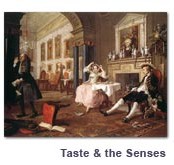Date/Time
Friday, April 13, 2012–Saturday, April 14, 2012
All Day
Location
William Andrews Clark Memorial Library
2520 Cimarron Street
—a conference organized by Peter H. Reill, University of California, Los Angeles; Peter Wagner, Universität Koblenz-Landa; and Frédéric Ogée, Université Paris Diderot
Co-sponsored by the Deutsch-Französische Hochschule/Université Franco-Allemande
and the Université Paris Diderot (Laboratoire de Recherche sur les Cultures Anglophones)

This international conference includes contributions by scholars from the United States, France, and Germany. It focuses on a few crucial aspects of the relations between taste and the senses in the long eighteenth century.
In the wake of the study of moral psychology inspired by Locke and Shaftesbury, the critical Enlightenment inquiry became concerned with the way in which art affects our emotions. Thus Dubos, in Réflexions critiques sur la poésie et la peinture (1719), defines taste as a sixth sense. Hutcheson (1725) follows Shaftesbury when he regards taste as an internal sense concerned with both morals and art, and Montesquieu sees it as an organ of the “body machine.” Many writers of the Enlightenment agreed that good taste is based on universally valid principles: Hume (1742) and Voltaire (1764) wrote on standards of taste while William Hogarth, in his Analysis of Beauty (1753), was, typically, preoccupied with “fixing the fluctuating Idea of Taste” for a new middle-class audience. A more relativist viewpoint emerged in the second part of the eighteenth century when Alexander Gerard (1759) defined the term as a responsive faculty of the imagination complementing the effort of the artist—taste is to the critic what genius is to the artist. Kant, in the context of discussing the sublime, insists on the varying notions of taste championed in different periods.
Clearly, then, taste is an issue relating to aesthetics, philosophy, art history, literature, and literary criticism, but also to social history, class distinctions, and gender. For much of the discussion briefly outlined above turned out to be, implicitly, a defense of the attitudes of an exclusive, male, elite. Papers address taste in the contexts of sight (fashion, chinoiserie, and art); hearing (music) and smelling (for example, odor in literature); tasting (as found in travel literature and fiction); and touching (as in health care).
Program
Session 1: Sight
Chair: Peter H. Reill, University of California, Los Angeles
Amélie Junqua, Université de Picardie
“Attraction and Control—The Taste for Colors in Addison’s and Steele’s Periodicals”
Frédéric Ogée, Université Paris Diderot
“Seeing the English Landscape Garden”
Session 2: Hearing and Smelling
Chair: Frédéric Ogée, Université Paris Diderot
Christoph Heyl, Universität Duisburg-Essen
“Handel’s Oratorios and the Taste of Eighteenth-Century London Audiences: Solomon and Theodora as Box Office Disasters”
Pierre Degott, Université de Metz
“Emotion, Affectation, and Theatricality: The Ethics of Hearing as a Matter of Taste”
Laurel Zeiss, Baylor University
“From ‘never offend the ear’ to ‘new fascinations with each hearing’: Listening to Mozart’s Music”
Session 3: General Philosophical and Scientific Background
Chair: Madeleine Descargues-Grant, Université Valenciennes
Peter H. Reill, University of California, Los Angeles
“Mediating Between the Senses and Reason: The Centrality of Aesthetics in Eighteenth-Century Thought”
Robert Mankin, Université Paris Diderot
“A Man of Sense Surveys Europe: Edward Gibbon Abroad, 1764”
Robert Maniquis, University of California, Los Angeles
“Bad Writing and Immorality, Tin Ears, and Vulgar Violence: The Politics of Taste from Dryden to Arnold”
Session 4: Tasting and Touching
Chair: Peter Wagner, Universität Koblenz-Landau
Ottmar Ette, Universität Potsdam
“Cornelius de Pauw or, the Taste of the New World”
Christoph Houswitschka, Universität Bamberg
“The Politics of Touch in the Eighteenth Century”
Marcel Hartwig, Universität Siegen
“Exploring the Varieties of Tactile Sensations: The Role of Palpation in Early Primary Health Care”

